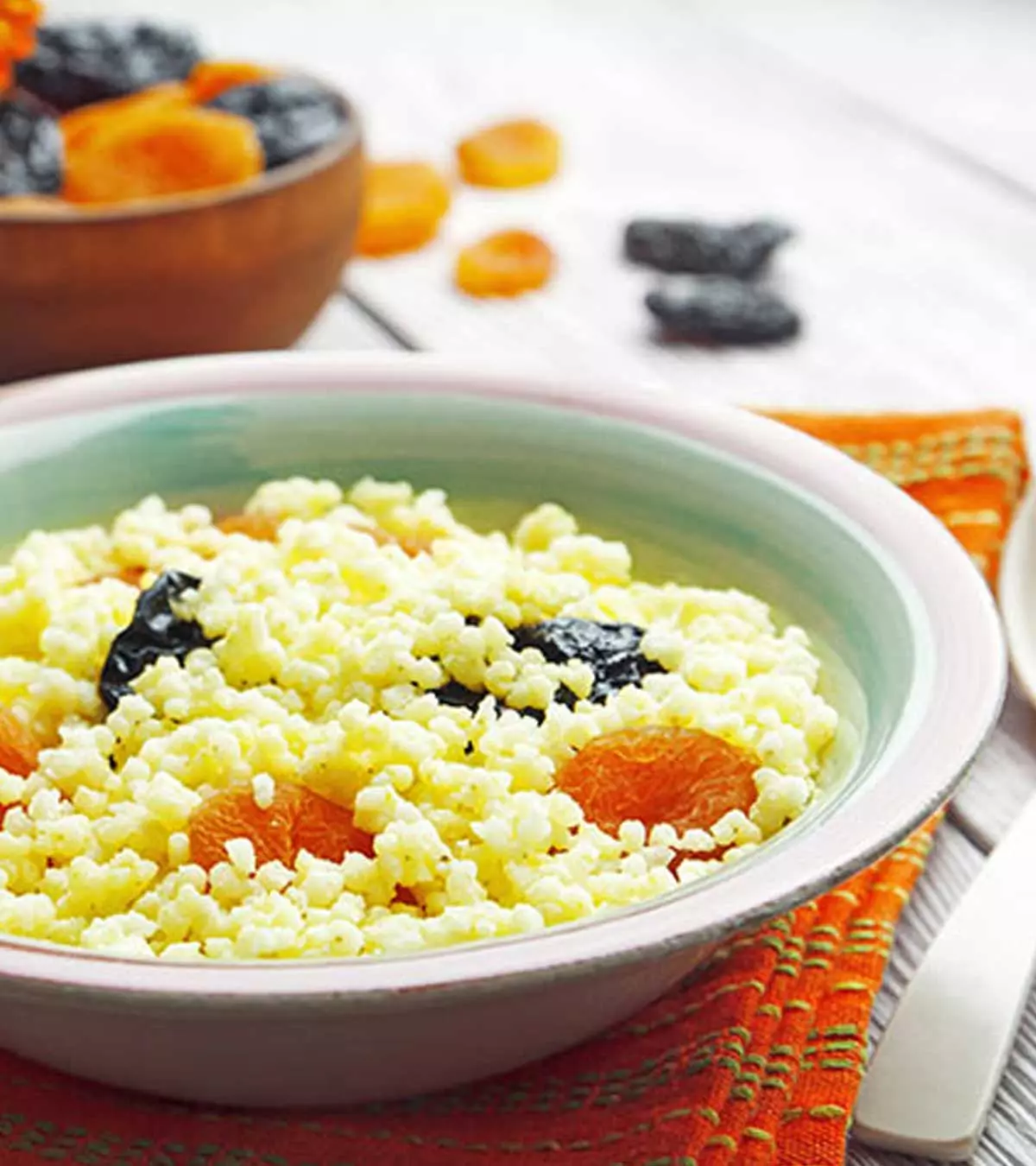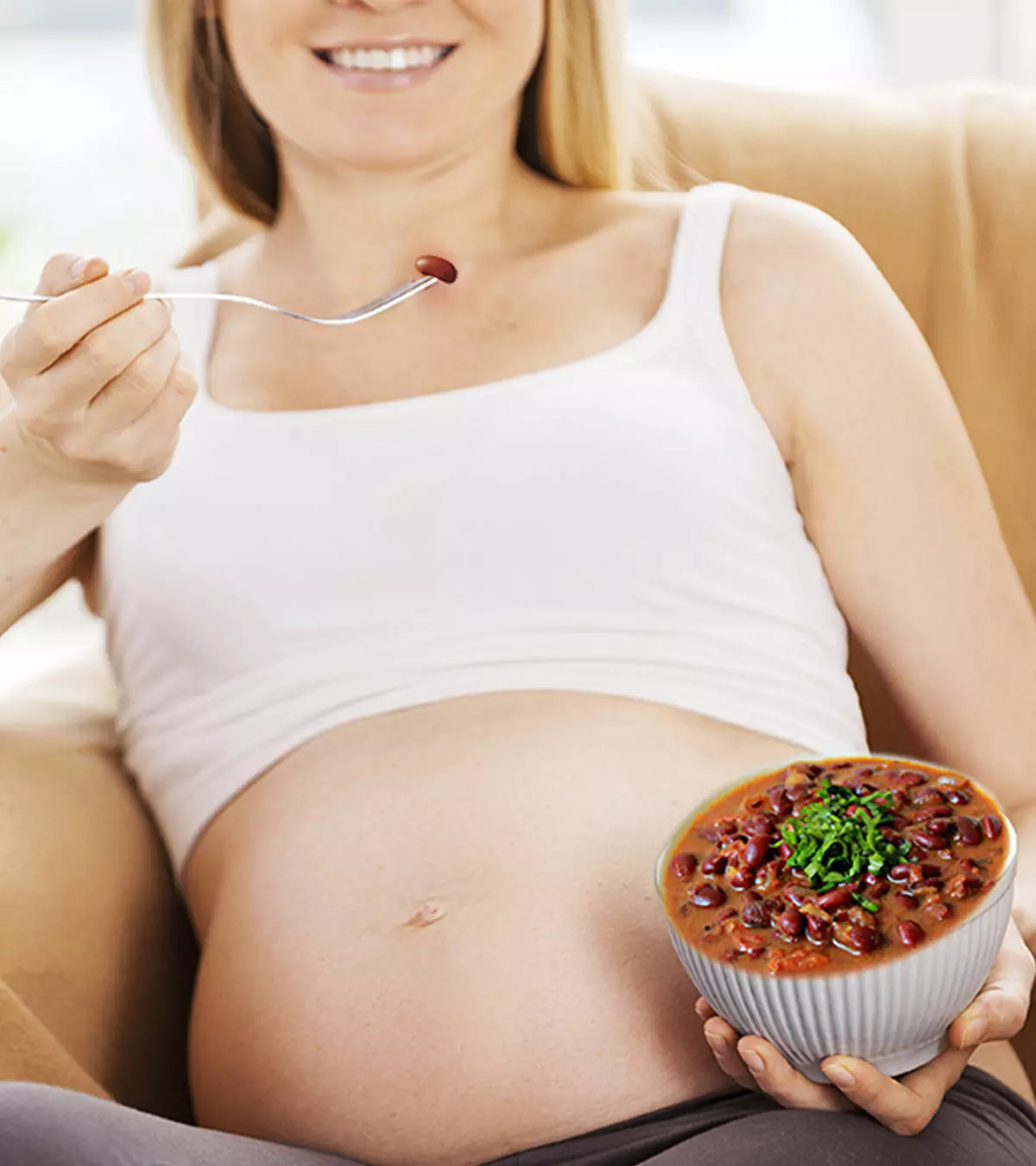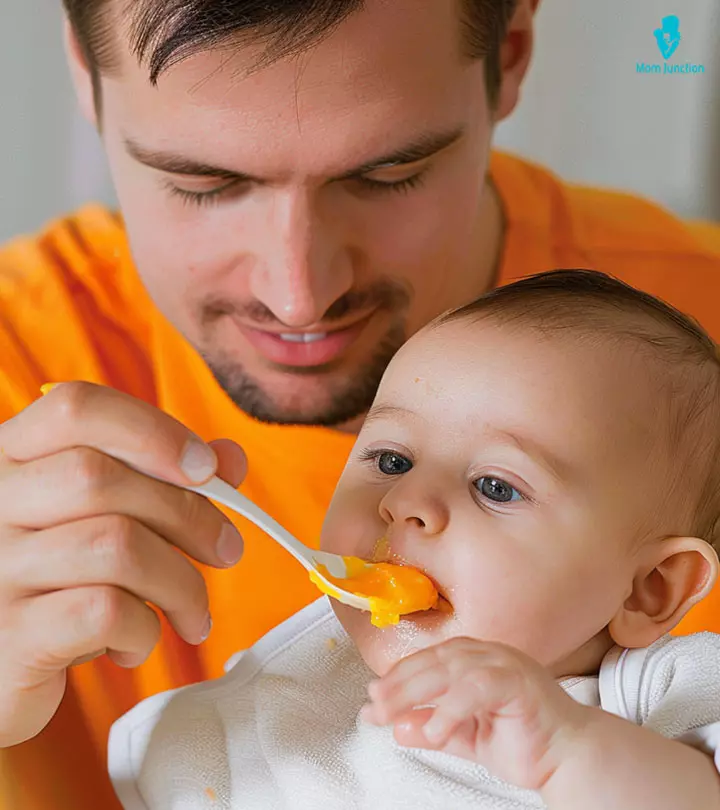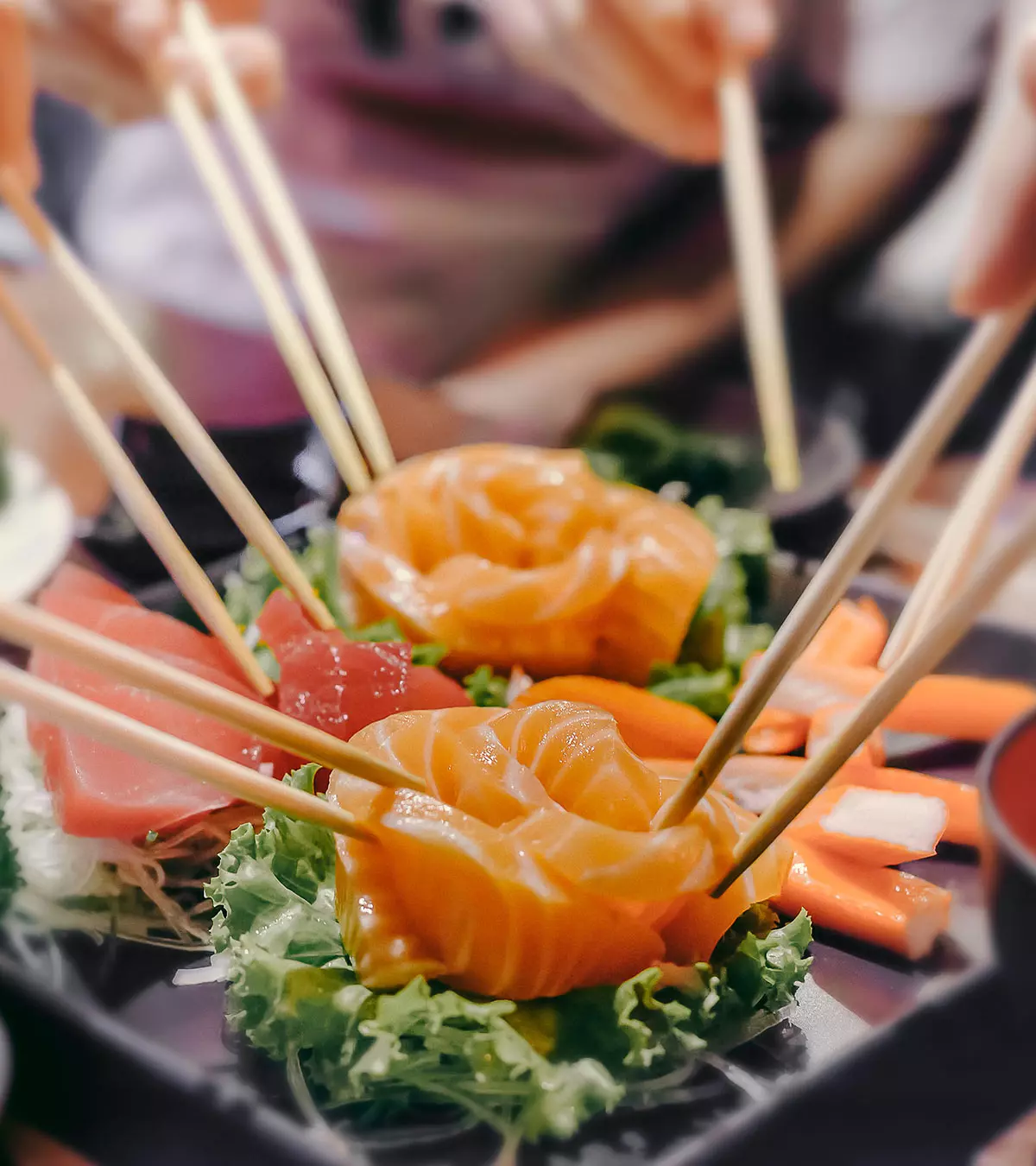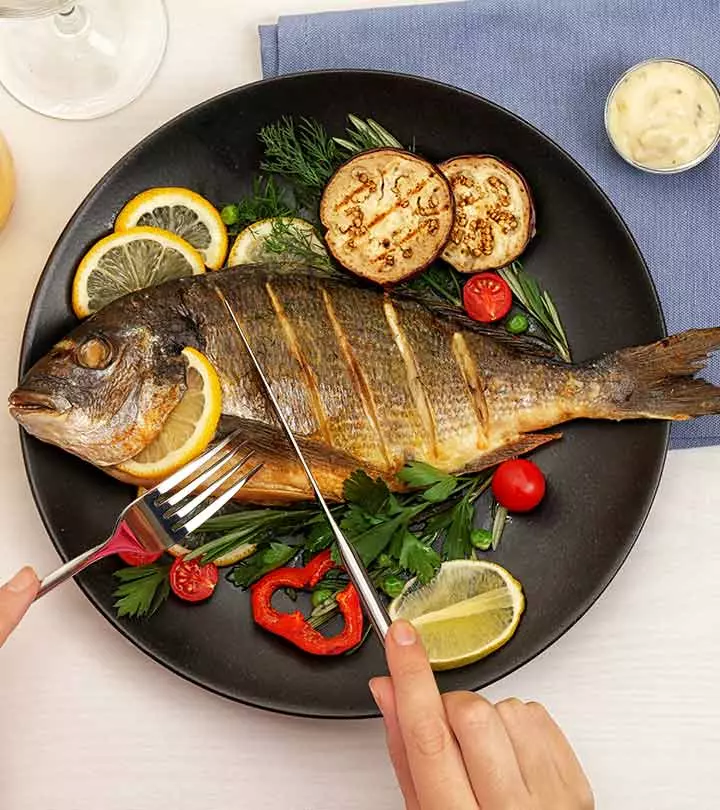
Image: Shutterstock
Most of the commonly eaten fish are safe during pregnancy. They are nutritious, too, as they have omega-3 fatty acids, protein, vitamins, and minerals. However, the problem is with the fish that have high levels of mercury.

Therefore, you need to know about the types of fish you can eat and the types you cannot eat when pregnant. In this post, MomJunction tells you about the benefits of eating fish, the safe and the unsafe fish, some safe ways to eat the seafood, and more.
Key Pointers
- Fish is a good source of omega-3, which can help prevent preeclampsiaiPregnancy complication characterized by high blood pressure and protein in the urine and promote healthy brain development in babies.
- Pregnant women should consume fresh, thoroughly cooked fish with less mercury content and more omega-3.
- About 8 to 12 ounces of fish such as shrimp, catfish, and salmon per week is recommended during pregnancy.
- Avoid consuming fish such as bass, king mackerel, and walleye.
Benefits Of Fish During Pregnancy
Listed below are the health benefits of having fish.
- Omega-3 fatty acids are likely to reduce the risk of coronary heart diseases by reducing triglycerideiThe most common type of fat found in the human body obtained from food levels and blood pressure levels. Research studies have found them to prevent blood clot formation and blood vessel inflammation (1).
- Omega-3 fatty acid DHA is known to diminish the effects of stress you might experience during late pregnancy. (2).

- Fish are a good source of protein that helps in supporting fetal growth (3).
- Fatty fish such as salmon provide abundant omega-3s that help in boosting the brain health of the baby. Brandon L. Reynolds, an adjunct professor in the University of Utah Department of Obstetrics and Gynecology, says (4), “The types of fats that are used in brain development are more plentiful in fish. We know there’s a connection between these types of essential fatty acids and brain development.” Intriguingly, a systematic review by researchers from multiple institutions uncovered that seafood consumption during pregnancy and childhood correlates with an IQ increase ranging from 4.8 to 9.5 points. Moreover, the study suggests that consuming more than 12oz per week of seafood yields favorable outcomes for the mother and child.
- The rate of preterm births reduces with the intake of fish (5).
 Quick fact
Quick factYou should be eating fish that is low in mercury to benefit from its nutrients. The right quantity of intake also matters.
How Much Fish Can A Pregnant Woman Eat?
According to the US Food and Drug Administration (FDA) and the US Environmental Protection Agency (EPA), you can eat 8 to 12 ounces of fish a week (4)
. This amounts to two to three servings of fish such as salmon, tuna (canned-light), cod, catfish and tilapia that are low in mercury.
Safe Fish And Their Quantities To Consume During Pregnancy
Eat fish that is low in mercury and high in omega-3.
Below is the list of fish you can eat. We have compiled it using the advisories issued by the various US states (6) (7).
| Type of fish (commercial) | How often to eat |
|---|---|
| Catfish (farm-raised), cod, crab, herring, oysters, pollock, anchovies, sole, plaice, haddock, salmon (farm-raised or wild, Pacific and Atlantic not Great Lakes), sardines, scallops, shrimp, tilapia and other purchased fish low in mercury | 2 servings per week |
OR Halibut, bullhead, lake whitefish, lake herring, bass (black), buffalo fish, carp, perch (freshwater), grouper, lobster (northern, Maine, Atlantic), mahi mahi (Dolphin-fish), Pompano (Florida), sablefish, sea trout (weakfish), scorpion fish, snapper, Spanish mackerel (S. Atlantic), tilefish (Atlantic), tuna (Albacore, Yellowfin, White, canned), white croaker (Pacific) | 1 serving per week |
AND Canned “white” albacore tuna, Chilean seabass, grouper, marlin, tuna steak or fillet. | 1 serving per month |
Sources
: University of Minnesota Extension and Purdue University
Fish To Avoid While Pregnant
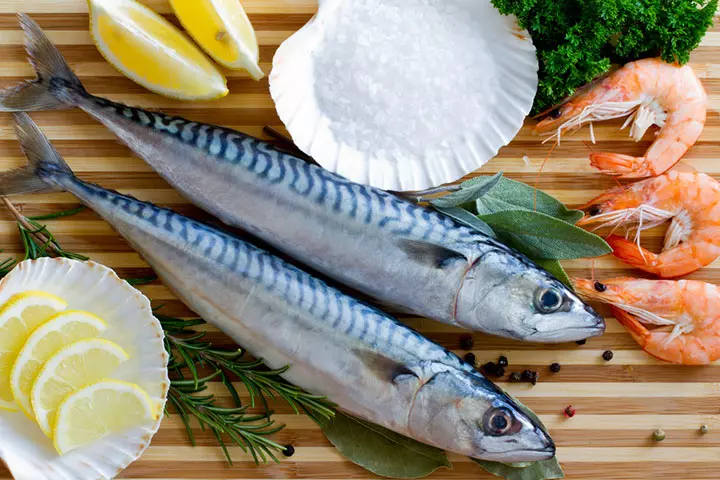
You should stay away from the below types of fish that are high in mercury (6). Mercury converts into methylymercury, which could be toxic to your nervous system:
Bass (striped), bluefish, Chilean sea bass, jack (Amber, Crevalle), king mackerel, marlin, orange roughy, shark, Spanish mackerel (Gulf of Mexico), swordfish, barramundi, tilefish (also called golden bass or golden snapper – Gulf of Mexico), tuna (all fresh or frozen), walleye (Great Lakes, Canada)
Risks Of Eating High Mercury During Pregnancy
Your body can absorb methylmercuryiA toxic form of mercury that can cause neurodevelopmental damage from fish, and pass it on to the baby, affecting their brain development and the nervous system.
Reynolds says (8), “When you have an excessive mercury intake, it concentrates within the developing brain of the fetus. When that happens, it can interrupt important connections necessary for brain development, which can lead to mental or neurological problems.”
According to the EPA, mercury can affect the cognitive skills (such as memory and attention), motor skills, language, and vision of the baby (9).
Therefore, you should take care while eating fish to avoid any harmful effects on the baby.
Safety Tips To Follow When Having Fish During Pregnancy
Even when you are eating safe fish, follow these measures to avoid exposure to any contaminants (10) (7).
- Eat commercially caught fish and avoid fish from local waters as they are prone to harmful chemicals. Go for local fish only if you are sure that the type of fish has been cleared for consumption by the fish consumption advisories (that are issued by the Environmental Protection Agency).
- Buy only fresh and properly refrigerated fish. Store them in a steel container and refrigerate until you cook them.
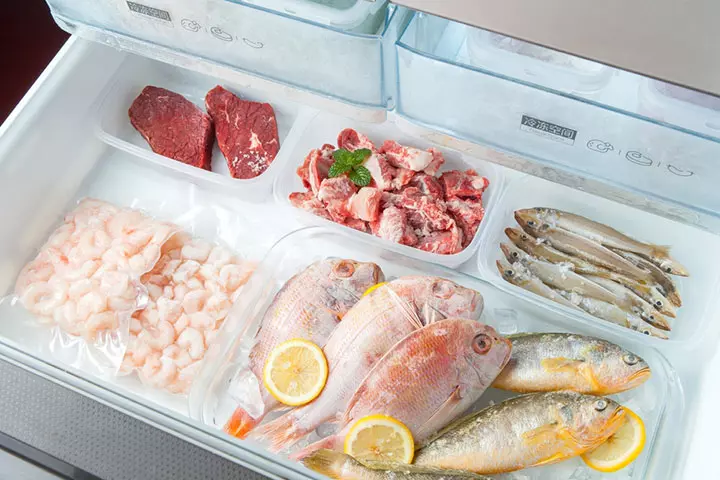
- Do not eat undercooked or raw fish as they harbor food poisoning bacteria such as salmonella and listeria.
- Cook fish until the internal temperature reaches 145oF (62.8 C) (11). You will know that the fish is properly cooked when its flesh turns opaque, and fillets peel off easily with a fork.
- Use separate knives and cutting boards for fish and other vegetables.
- Avoid reusing marinades.
 Quick fact
Quick factIf you are following all the precautions in selecting and cooking the fish, there are some delicious dishes that you can relish during pregnancy.
Some Best Ways To Include Fish In Pregnancy Diet
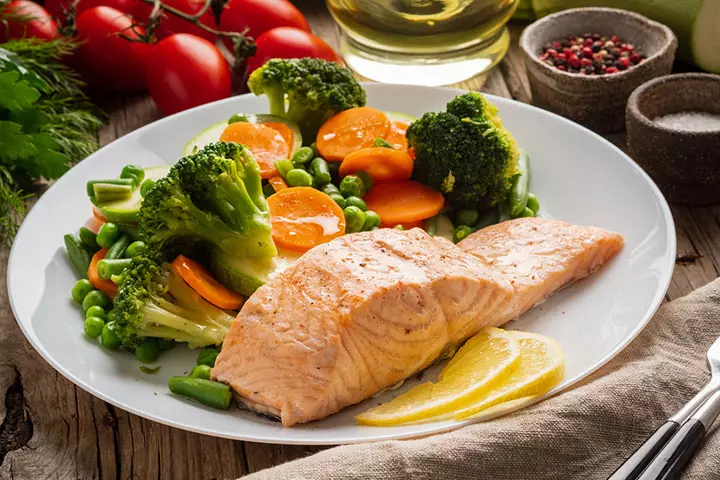
Here are some ways to cook fish.
- Grilled fish: Brush the grill plate with a little oil and keep the marinated fish on it. Flip both the sides until it turns brown. You can have it with sautéed vegetables.
- Steamed fish: Brush the fish with mild spices and marinade, and place it in a steamer basket.
- Poached fish: Pour water or vegetable stock in a vessel, and put the fish pieces. Once you see it is cooked, remove, and you can have it with rice or bread.
Fish is a nutritious option if you love it. But if you don’t like it or you are a vegetarian, then you might have to get the nutrients such as omega-3s from other food sources.
Alternative Ways To Get Omega-3 Fatty Acids
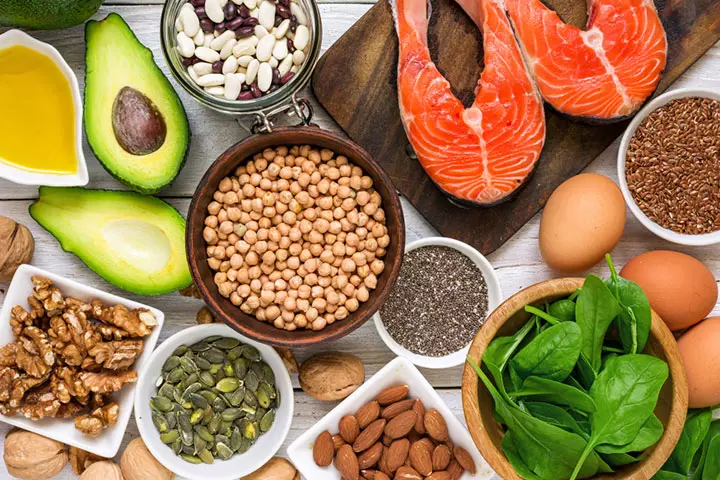
Omega-3 fatty acids are an essential part of your diet. If you do not eat fish, you can consume alternatives such as (12):
- Flaxseeds or flaxseed oil mixed with any cereal, oatmeal, or yogurt
- Mixed greens such as spinach, kale, and other dark leafy vegetables
- Canola oil can be used for baking, stir-frying, or cooking
- Walnuts or walnut oil
- Soybean, soybean oil, and tofu
- Enriched dairy foods
- Wild rice
- Eggs
Next, we have some common queries answered about the consumption of fish during pregnancy.
Frequently Asked Questions
1. Does it harm if you eat one serving of a high-mercury fish?
No, it does not cause any effects if you have one serving of a high-mercury fish. But if you have it regularly in large quantities, it could be harmful.
2. Can you avoid all fish, and include only Omega-3 supplements?
You may avoid fish and take the alternative food sources. But you should talk to your doctor about taking omega-3 supplements.
3. Is fish good during the first trimester?
In a study done in Spain between 2004 and 2008, the consumption of fish in early pregnancy showed higher cognitive test scores and fewer traits of autism spectrum disorder in children (13).
4. Is overeating fish bad for pregnancy?
Overeating fish or any other food is not good during pregnancy. Have everything in moderation to reap the benefits and avoid any side-effects.
5. Is it safe to eat sushi during pregnancy?
Sushi contains raw fish that has a high probability of containing bacteria and parasites. This may increase the risk of food poisoning. Therefore, it is good to avoid sushi during pregnancy.
6. Is California roll safe for pregnant women?
California roll is a type of sushi roll that contains cooked fish, imitation crab meat, or vegetables. Consuming California rolls made from imitation meat or vegetables may be safe to consume during pregnancy.
7. Can I eat fried fish or battered fish during pregnancy?
Yes, you can eat fried or battered fish as long as it is a low-mercury variant and is cooked to an internal temperature of 145°F (14).
There is no need to stop eating fish during pregnancy if you love eating it. It’s high in omega-3 fatty acids and protein, beneficial for fetal development. However, you should be cautious about which fish to eat during pregnancy, as not all fish are healthy for pregnant mothers. To appreciate the taste and benefits, it is recommended to cook it thoroughly and consume it in moderation. You can eat grilled, steamed, or poached fish, but you should avoid eating undercooked and raw fish.
Infographic: Making Pregnancy-safe Sushi At Home
Sushi may contain raw fish, which is not recommended during pregnancy, but that doesn’t mean you must forgo Sushi throughout your pregnancy. Check out the infographic below to learn delicious pregnancy-safe Sushi recipes that you can easily prepare at home. Illustration: Momjunction Design Team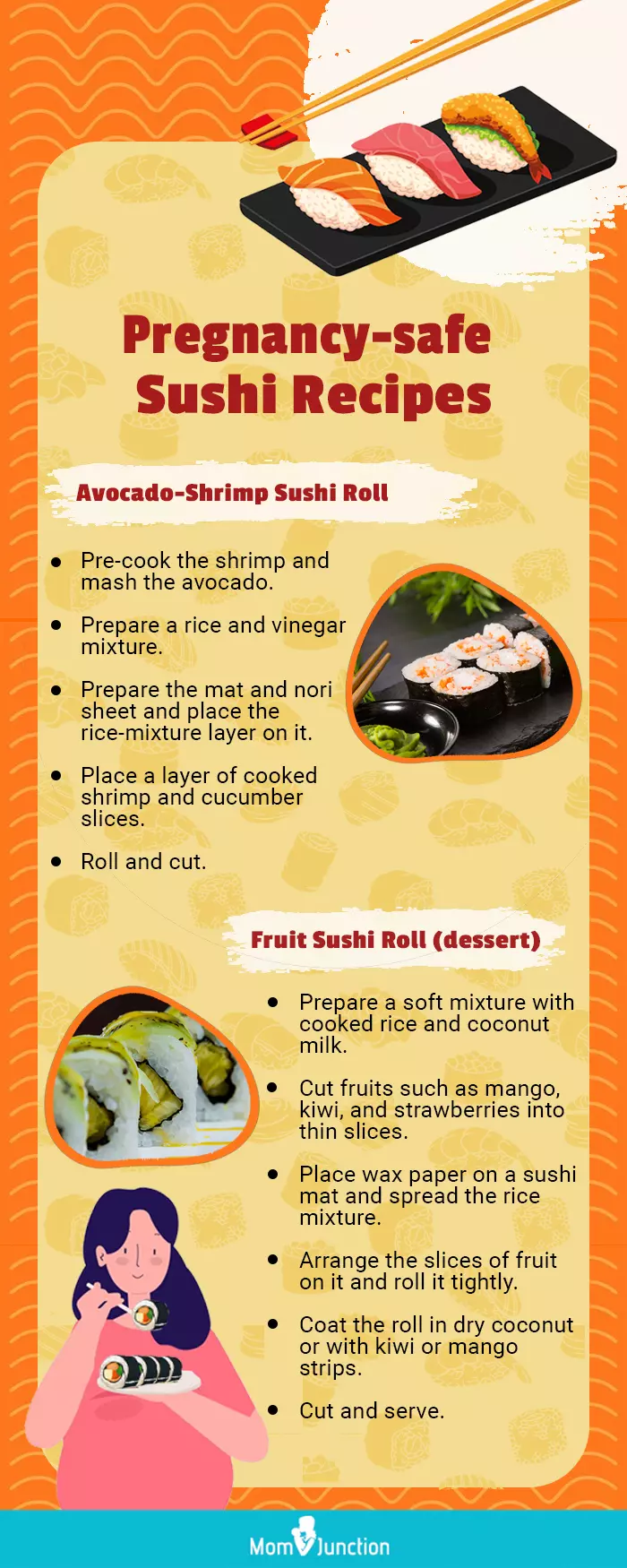
Pregnant women can consume fish during pregnancy, but it’s important to know which types are safe. Learn more in this video!
References
1. Omega-3 Fatty Acids and Coronary Heart Disease; University of Rochester Medical Center
2. Ab LatifWani et al.; Omega-3 fatty acids and the treatment of depression: a review of scientific evidence; Integrative Medicine Research (2015)
3. Fatemeh Borazjani et al.; Milk and Protein Intake by Pregnant Women Affects Growth of Foetus; J Health Popul Nutr (2013)
4. Pregnant? Eat more fish but proceed with caution; University of Utah (2014)
5. Preterm Birth: Causes, Consequences, and Prevention; The National Academies of Sciences Engineering Medicine (2007)
6. C.R. Santerre; Fish for Your Health; Purdue University (2009)
7. Choose your fish; Minnesota Department of Health
8. Pregnant? Tuna May Not Be Safe To Eat; The University of Utah (2014)
9. Methylmercury and Human Embryonic Development; The Embryo Project at Arizona State University (2018)
10. Should I Eat the Fish I Catch; United States Environmental Protection Agency (2014)
11. Xi Chen; Is it done yet? A guide to safely cooking meat; Michigan State University Extension (2015)
12. Omega-3 Fatty Acids; NIH (2021); University of Wisconsin Integrative Medicine (2007)
13. Jordi Julvez et al.; Maternal Consumption of Seafood in Pregnancy and Child Neuropsychological Development: A Longitudinal Study Based on a Population With High Consumption Levels; American Journal of Epidemiology (2016)
14. People at risk: Pregnant women; Food Safety
Community Experiences
Join the conversation and become a part of our nurturing community! Share your stories, experiences, and insights to connect with fellow parents.
Read full bio of Jyoti Benjamin
Read full bio of Swati Patwal
Read full bio of Rebecca Malachi
Read full bio of Aneesha Amonz






